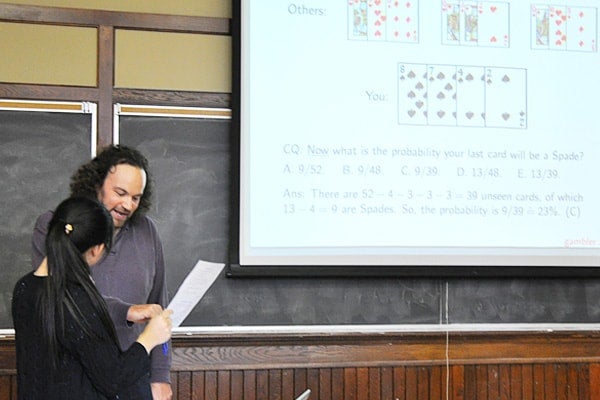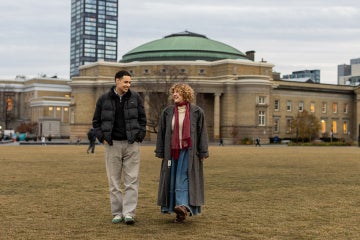
Why numbers matter: from gambling to poetry
Published: October 24, 2012
"You need $2,000 to escape the mob by tonight, otherwise you’ll be killed. You have $1,000. Let's say you decide to play red at Roulette at the casino to get the money. What's the best option?"
Statistics professor Jeffrey Rosenthal posed this scenario to his class of about 80 students in a classroom on the second floor of the Old Vic building. What are the best odds for making another $1,000? Bet it all or bet by small increments?
"You bet the entire $1,000 on the first spin," he said, to laughter and sighs. "You have to be bold and get it all over with. The more bets you make, the more chances you have of losing. Don't drag it out. I still don't recommend this, but it's smarter than the other options!"
Rosenthal teaches a new statistics course on quantitative reasoning called Why Numbers Matter. It’s designed especially for humanities students who think they have no talent for mathematics or haven't taken it since high school. Some take it to fulfill a breadth requirement; others because they know quantitative reasoning is a handy skill. Rosenthal uses examples from all over, including music, poetry, lottery, politics, sports and gambling. He'll use a scene from Casablanca to discuss gambling or ask "who here owns music by the rapper Drake" when discussing representations in sample statistics.
"These topics are related to things students care about, but here they will think about the topics in a different way," says Rosenthal. "And we'll go through the topics and spend as long as it takes to make them clear and develop a series of different quantitative themes and perspectives."
Rosenthal, who wrote the book Struck by Lightning: The Curious World of Probabilities, is frequently quoted on statistics and was even featured in a commercial this year on the odds of finding a gold key in a Caramilk bar. His Why Numbers Matter course was created through the Faculty of Arts & Science's Curriculum Renewal Initiatives Fund which supports the development of new and innovative courses using hands-on learning approaches.
“This course is one of many new initiatives in the Faculty of Arts & Science designed to ensure that all students graduate with a set of key transferable skills that they can apply to every situation and that will ensure their success no matter what careers or roles they take on over a lifetime. These include the ability to critically evaluate information , as well as adaptability, strong communications skills, problem-solving and the ability to work alone or in groups,” says Meric Gertler, dean of the Faculty of Arts & Science.
"Students have already told me it's interesting and understandable," Rosenthal says. "I hope that even if these students don’t take any more statistics or math classes in the future, they will have a little more of an open or curious mind. You can be a more informed citizen and understand things that come up in the newspaper and even make better daily life decisions by understanding statistics."



